Archive 2019/2020
Georgie Hill
The recipient of the 2019/2020 award is Georgie Hill
“Georgie Hill’s practice is quietly outrageous. Working in watercolour – not often seen in contemporary art – the artist consistently challenges the perceived vulnerability of the medium, through incising or perforating the paper, pushing the material to its limits. In this sense it is unique not just for its technical precision (which is acute), but for its commitment to forms of risk within that.
Architectural structures and interior spaces often appear in the work, led in part by the artist’s interest in less-visible histories of modernism – past work has referenced Eileen Gray, Frances Hodgkins, Charlotte Perriand and Lilly Reich. In more recent work there is a growing presence of the weather, the atmosphere, the climate, and the psychological effects of environmental instability in the present. There is the acid wash ground, evoking a storm, forms suggesting seismic pressure, and the marks of physical disturbance on the picture plane itself. Something huge is surely happening in this work; I'm excited to see how it develops. Georgie has always worked part-time, and I know the extended period of focused time made possible by this support will be immensely meaningful for this practice.”
– Curator for the 2019/2020 award, Abby Cunnane
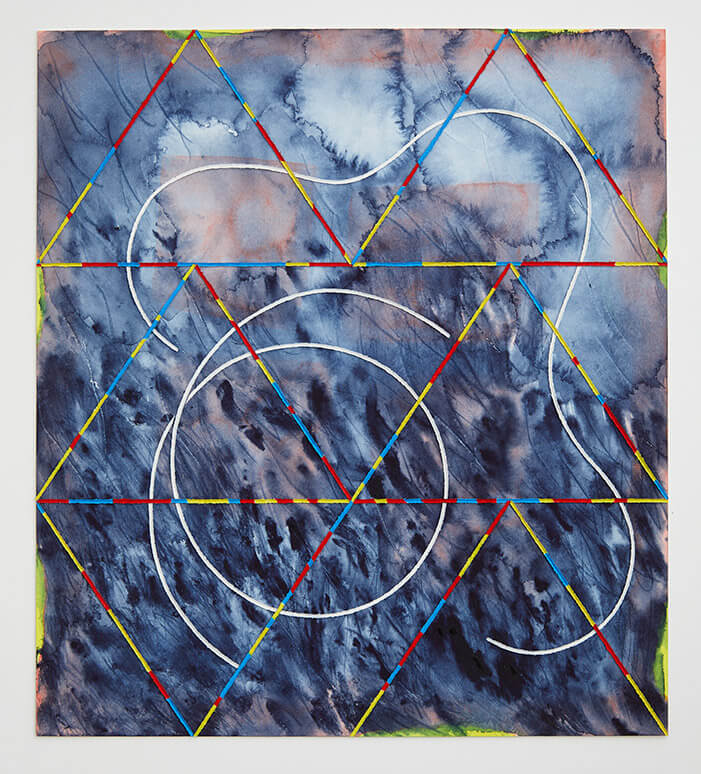

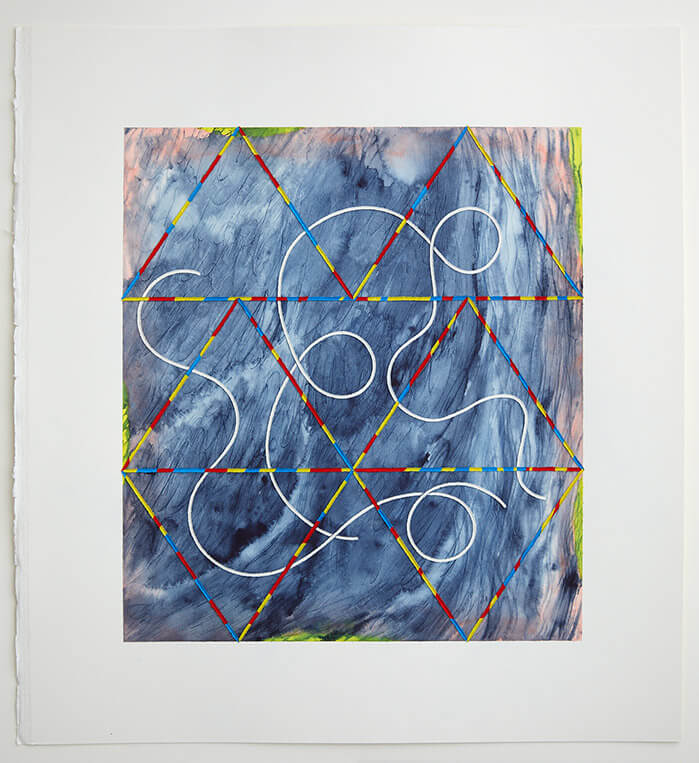

Forecast (Detail)/Bodily Eyes See Bodies (2), 2019
watercolour on incised paper
441 × 412 mm
Forecast (Detail)/The Crystal was a Thought (3), 2019
watercolour on incised paper
441 × 412 mm
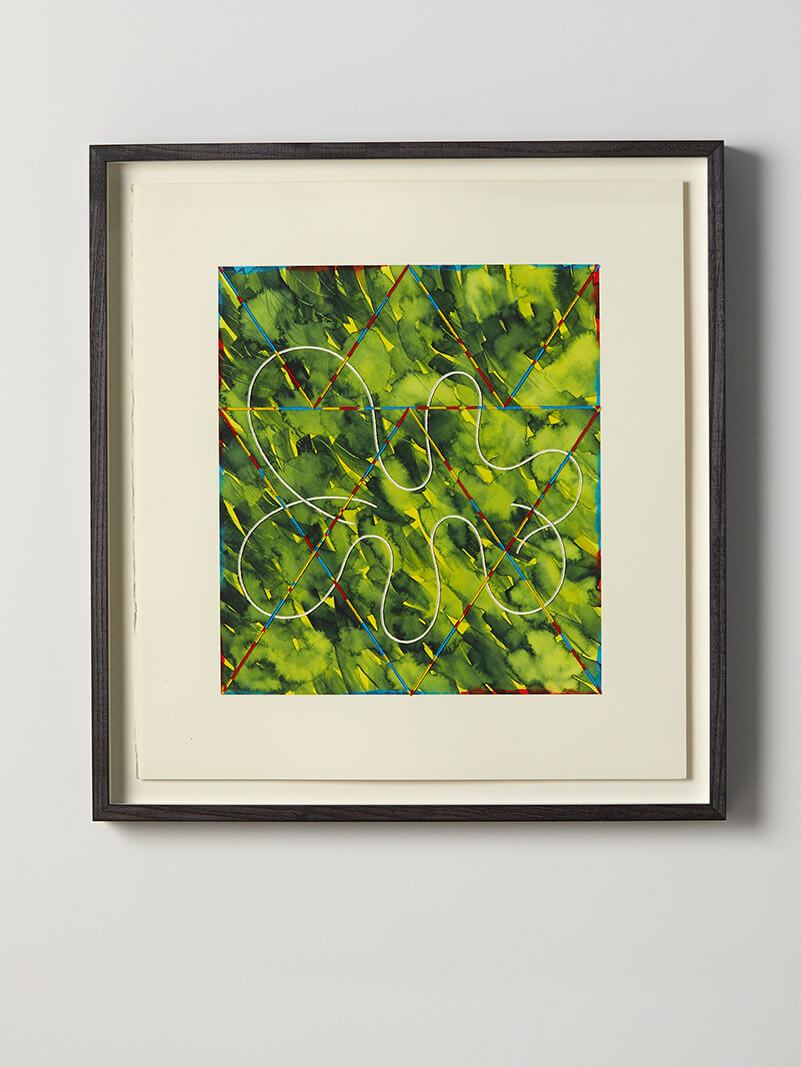

Adaptation Sequence (2), 2019
watercolour on incised paper
441 × 408mm
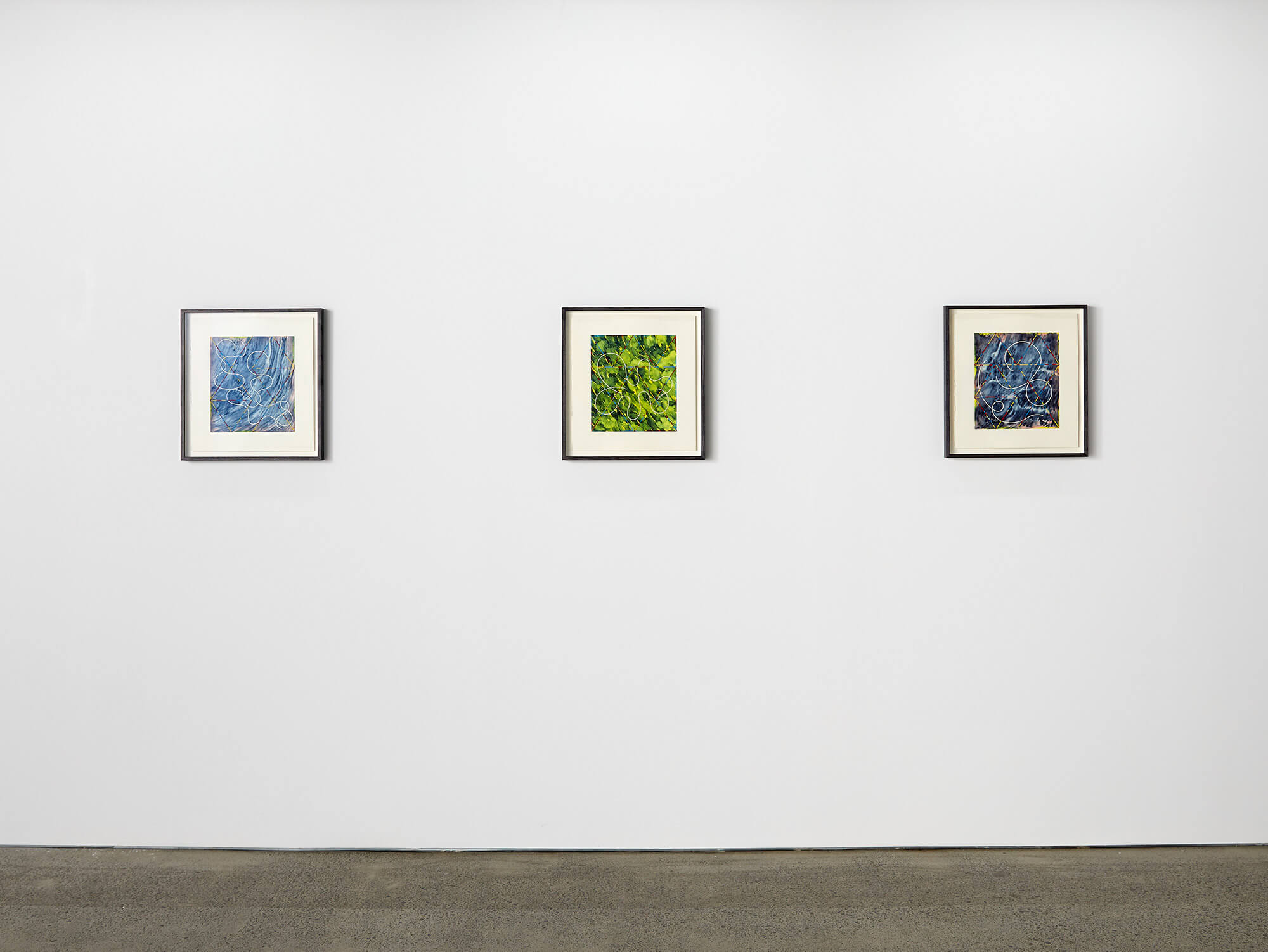

Installation view: Residence Within A Prism
Bowerbank Ninow August 2019
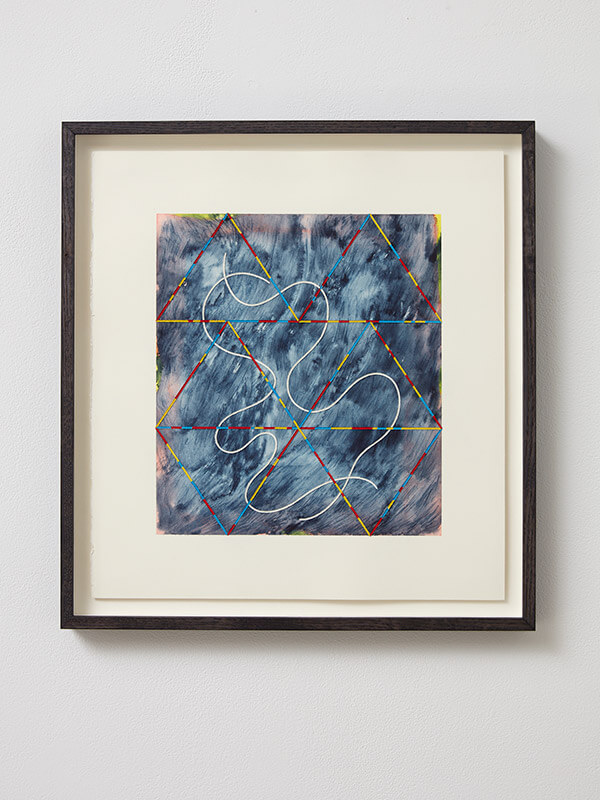

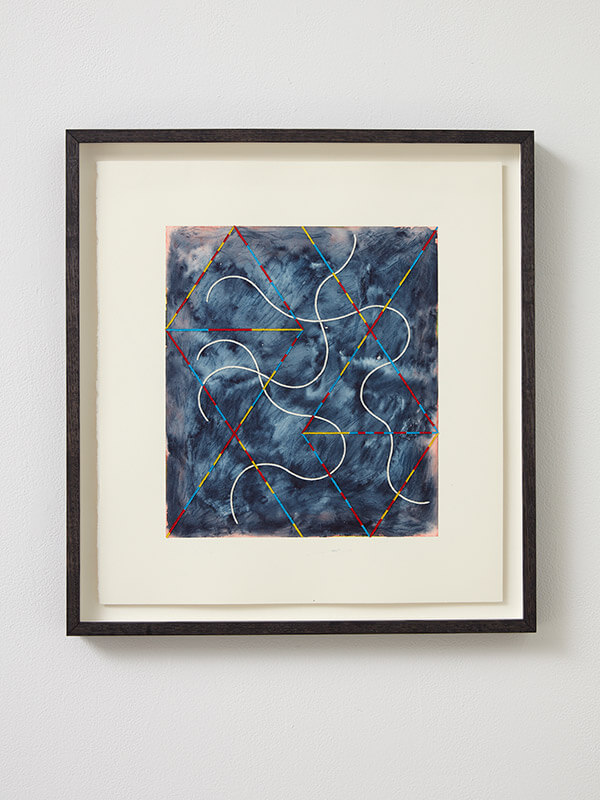

Forecast (Detail) 3, 2019
watercolour on incised paper
441 × 407mm
Forecast (Detail) 2, 2018
watercolour on incised paper
421 × 387mm
Georgie’s most recent exhibition Residence within a Prism at Bowerbank Ninow, Gallery, 29 August to 21 September 2019, was accompanied by Andrew Clark's exhibition text:
Georgie Hill works thoughtfully and methodically, building her works piece by piece, as if assembling the complex inner workings of a finely-tuned instrument, either musical or scientific — or both. Hill’s works resemble diagrams, although their function is as much lyrical as it is schematic. Her work is perhaps best interpreted in terms of verbs, rather than adjectives, as a sequence of actions taken by the artist: directing, measuring, repeating, sensing, connecting, superimposing. Likewise, the way Hill’s works are made involves multiple layers of painting that react and respond to one another.
Her first layers are nebulous, chaotic fields of colour, resembling rain, clouds or other natural phenomena in their irregular, organic patterning. Next, Hill cuts into her heavy paper support with a blade, creating raised channels within which the paint flows, allowing her to render a second layer of sharply defined, precise linework while also bringing into play the raised edges of the incision. These lines are painted so that whenever they cross a tonal boundary in the background, their colour changes, injecting a self-reflexive, pseudo-random element to the work. Bahktin regards creativity as a fundamentally dialogic process, in which the artist speaks “in the language of another’s discourse,” and by doing so realises the potential of that other, makes them whole and brings forth the aesthetic object.¹ This is the multivalent, circuitous view of the artist’s role depicted in Hill’s works; the shifting, prophetic territories they offer the viewer are also the terrain of the creative process itself, absorbing and being absorbed by the inexorable tides of future events.
Hill cites as particular influences on her practice the works of Hilma af Klint and Sophie Taeuber-Arp, both early modernists who dealt with pure abstraction while that form of art was still in its infancy. Hill’s work evokes ideas such as communication systems, zones of force or influence, or schematic descriptions of complex systems, all of which could equally be applied to af Klint and Taeuber-Arp’s works. Hill shares with af Klint a concern with the dynamics that underpin human experience, perception and thought, a desire to unpick the threads of the pattern that make up the phenomenal world. Viewed through this prism, Hill’s works could likewise be interpreted as diagrams, schematics or plans. She casts the works in this light when she refers to their status as “approximations of future events” and “systems, trends or prophecies.” The idea of “prophecy” is a potent one, in this context, containing both the idea of temporal displacement — a statement out of time, communicating with the future in the same way that af Klint’s occultist abstractions, unseen during her lifetime, gained new currency almost a century later — and the idea of a received message alien to the listener but susceptible to interpretation and exegesis.
The titles of all but one work in this exhibition are drawn from Doris Lessing’s 1971 visionary novel Briefing for a Descent into Hell. This text is difficult to summarise, but hinges on the inner world of an amnesiac professor and uses science fiction and fantasy elements as a framework to explore metaphysical and spiritual concerns, as well humanity’s impact on the environment. Hill’s work is similarly concerned with the way large scale events are reflected in the microcosmic realms of thought, memory and dream. Having experienced the Christchurch earthquakes in 2010 and 2011, she has a first-hand understanding of the natural world’s potential for instability, and the way such events become internalised parts of private psychic landscapes. This connection between the broad and the intimate, between exteriority and interiority, is crucial to Hill’s work. In the newer paintings, elements suggesting weather maps point towards climate change as a source of this internalised anxiety or fear. The work deals with the way complex, chaotic realities are modelled and interpreted through rational systems, and the disconnect that can arise between map and territory in these situations.
By injecting an element of chance and reflexivity into her process, Hill empowers her works to question monovalent, singular visions of the future, instead offering images of networks, congruences, and affinities — opportunities for dialogue and exchange. By invoking the earliest phases of the modernist artistic revolution, when ideas about the role and nature of art and creativity were still plastic and malleable, Hill is perhaps signalling the merits of flux and uncertainty, and the need to internalise this kind of flexible thinking in order to cope with an ever-changing present.
1 Mikhail Bahktin, “Discourse in the Novel,” in The Dialogic Imagination: Four Essays (University of Texas Press, 1981), 347, cited in Deborah J. Haynes, Bahktin and the Visual Arts (Cambridge University Press, 1995), 14.
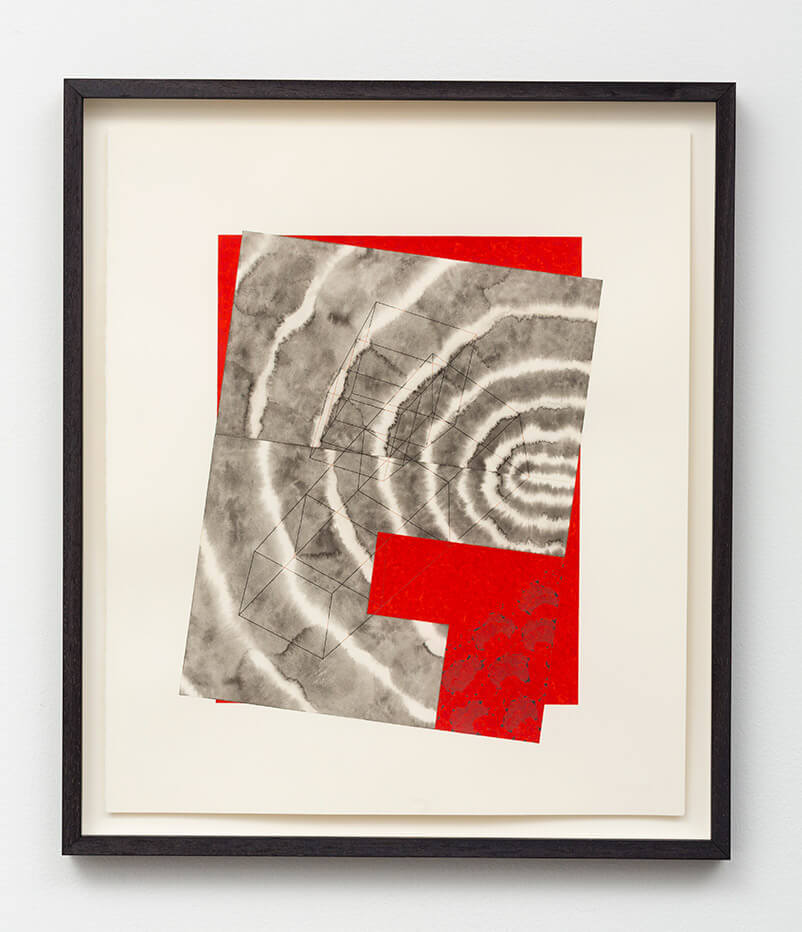

Pale Fictions (Viewpoint #2), 2013
watercolour and graphite on paper
452 × 385mm
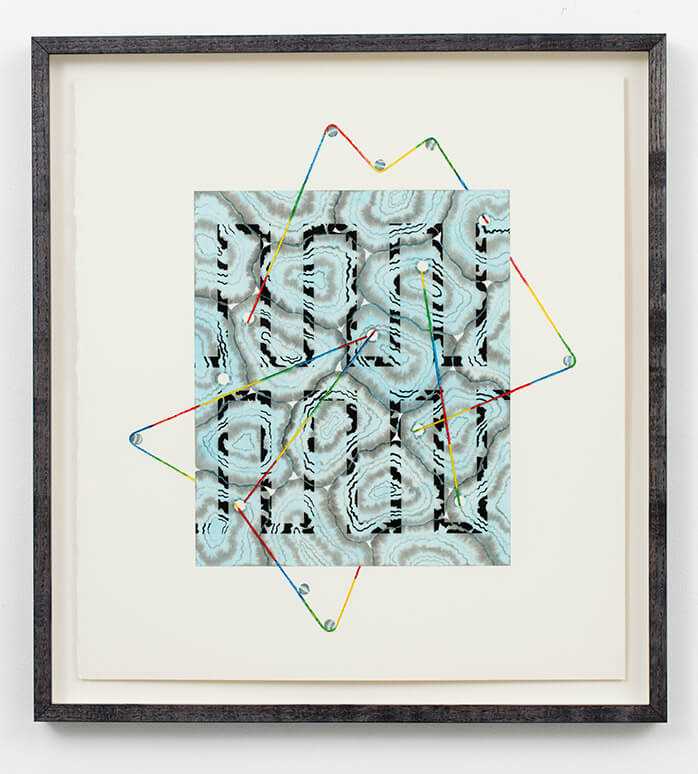

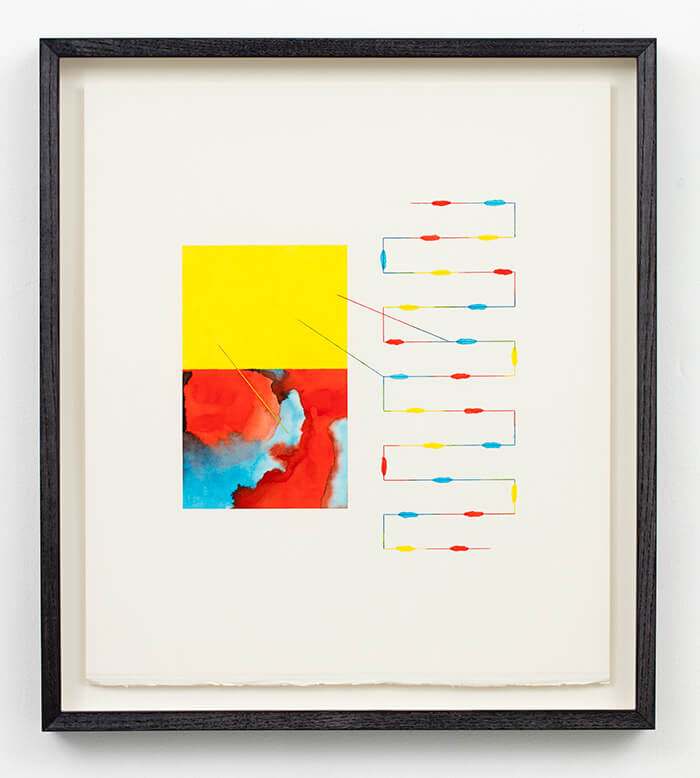

Circle remains (2), 2016
watercolour on incised paper
422 × 385mm
Approximations, 2016
watercolour on incised paper
383 × 335 mm
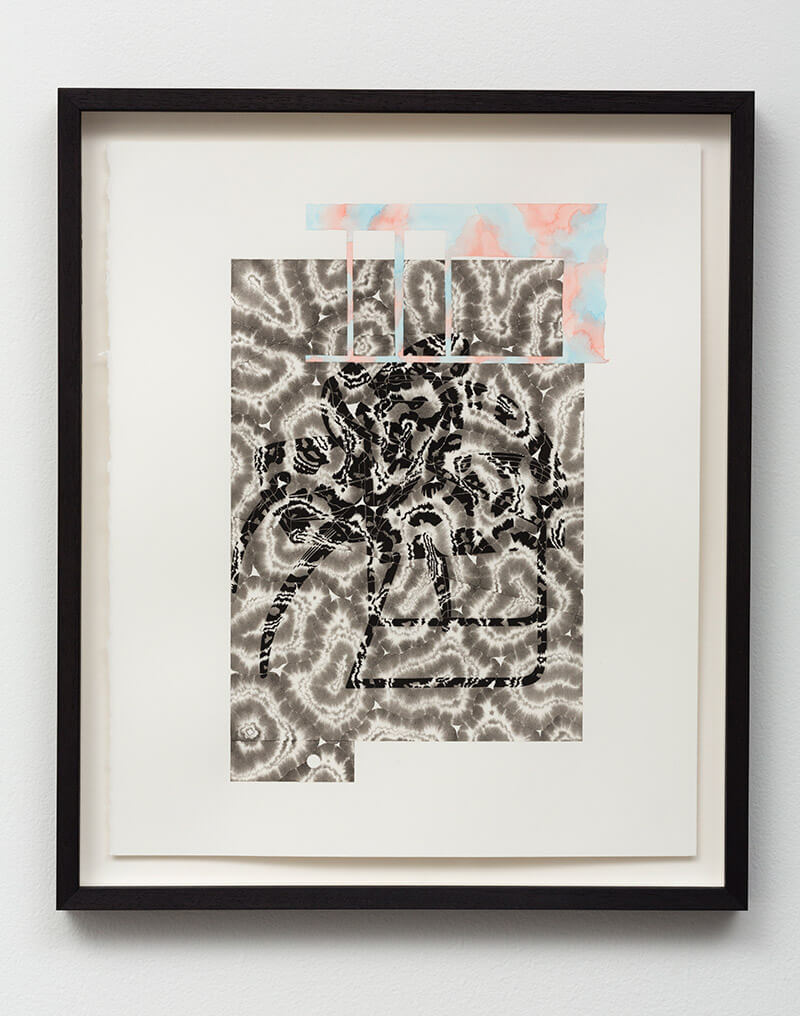

Back to Back (Eileen Gray Non Conformist Chair with Ruhlmann Defenses Chair), 2013
watercolour and graphite on paper
397 × 330 mm
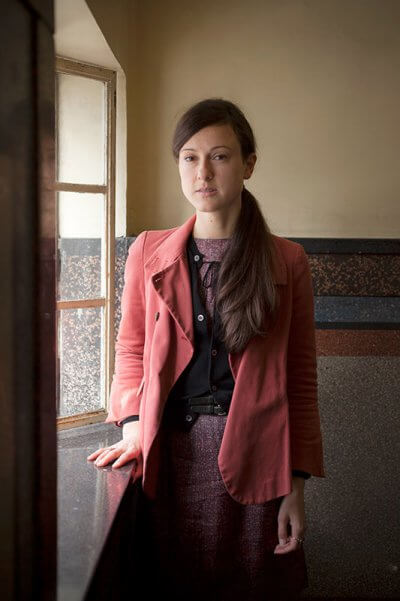

Georgie Hill – Curriculum vitae
Born Auckland, New Zealand, 1979
Lives Auckland, New Zealand
Education
2001 – BFA Elam School of Fine Arts, The University of Auckland
Selected Exhibitions
2019
Beijing Contemporary Art Fair, Bowerbank Ninow, Beijing, China
Residence Within A Prism, Bowerbank Ninow, Auckland
A More Comprehensive Physical Explanation, Bowerbank Ninow, Auckland (group)
Auckland Art Fair - Bowerbank Ninow (group)
2018
Unseen, Unknown: Unveiled, Malcolm Smith Gallery, Auckland, Curated by Alice Tyler and Zoe Hoeberigs (group)
2017
Fluid Structures, Parlour Projects, Hastings, curated by Francis McWhannell (group)
2016
Forecast (Detail), Ivan Anthony, Auckland
2015
Semi-Supine View, Ivan Anthony, Auckland
2014
Rainbow Rose Parallelogram, Ivan Anthony, Auckland
Feint, Gus Fisher Gallery, Auckland, curated by Aaron Lister
Object Shift, Objectspace, Auckland, curated by Ioana Gordon-Smith (group)
Hue and Cry, Issue no. 8, 2014 (page work)
2013
Pale Fictions, Ivan Anthony, Auckland
Feint, City Gallery Wellington, curated by Aaron Lister
2012
Chromesthesia, Robert Heald Gallery, Wellington
Breathing Space (with Zina Swanson), Christchurch Art Gallery
2011
True Time lurks, Ivan Anthony, Auckland
Cy, Robert Heald Gallery, Wellington (group)
2010
Protective Colouration, Robert Heald Gallery, Wellington
Cold Shoulder, Ivan Anthony, Auckland
Brought to Light: A New View of the Collection, Christchurch Art Gallery (group)
2009
L - shaped counter, The Physics Room, Christchurch
Cloud 9 – New directions in contemporary painting, Christchurch Art Gallery (group)
2008
Watchtower, Ivan Anthony, Auckland
National Drawing Award, Artspace, Auckland; Enjoy Public Art Gallery, Wellington; The Physics Room, Christchurch (group)
2007
Every colour by itself (with Saskia Leek and Daniel Calvert), Ivan Anthony, Auckland
2003
Pelvic Trust Gallery, Auckland (group)
2002
House and Garden (with Ruth Buchanan), George Fraser Gallery, Auckland
2001
Decoration and Crime (with Ruth Buchanan), Enjoy Gallery, Wellington
Banned practice, Newcall Tower, Auckland, curated by Anthony Byrt (group)
Pre-memorabilia, The Fame Game, Rm 401, Auckland (group)
Awards
2019
C Art Trust Award
2011
Olivia Spencer Bower Foundation Art Award (1 Year residency)
Collections
Private collections in New Zealand, Australia and China
The Chartwell Collection, Auckland Art Gallery Toi o Tamaki
Christchurch Art Gallery Te Puna o Waiwhetu
James Wallace Arts Trust, Auckland
University of Auckland
Selected Reviews and Texts
Tyler, Linda, "Georgie Hill, detailing the route between order and chaos", exhibition essay for Fluid Structures, Parlour Projects, Hastings, 2017, curated by Francis McWhannell
Smaill, Anna, "Forecast (Detail)", exhibition essay for Forecast (Detail), Ivan Anthony, 2016
Tyler, Linda, "From Ghillie Suit to Glittering Kowhaiwhai - Contemporary New Zealand Artists Deploy the Camouflage Aesthetic", Camouflage Cultures: Beyond the Art of Disappearance, Sydney University Press, 2015
Hurrell, John, "Georgie Hill Watercolours", EyeContact, 6 August 2015: http://eyecontactsite.com/2015/08/georgie-hill-watercolours
McNamara, TJ, "Dashing way with the abstract", The NZ Herald, August 8 2015
McNamara, TJ, "Abstraction a driving force", The NZ Herald, Sept 20 2014
Burgess, Malcolm, "Feint", Art New Zealand, Issue 149, Summer 2014, pg 34
Lister, Aaron, "Ripolin", Feint exhibition catalogue, City Gallery Wellington, 2014
Smaill, Anna, "Feint", Feint exhibition catalogue, City Gallery Wellington, 2014
Tyler, Linda, "The Elegant Detail", Feint exhibition catalogue, City Gallery Wellington, 2014
Cardy, Tom, "Watercolours take on new meaning", The Dominion Post, Dec 12, 2013
Hurrell, John, "Georgie Hill", EyeContact, 6 August 2013: http://eyecontactsite.com/ 2013/08/georgie-hill-exhibition
Were, Virginia, "Intense vibrations of colour", Art News NZ, Spring 2012, pg 74
Hurrell, John, "Georgie Hill goes mellow with spring light", EyeContact, 31 March, 2010: http://eyecontactsite.com/2010/03/georgie-hill-goes-mellow-with-spring-light
McNamara, TJ, "A fitting tribute to Frances Hodgkins", The NZ Herald, 3 April, 2010
Hay, Jennifer, "Cloud 9 – New directions in contemporary painting", Bulletin B.158, Christchurch Art Gallery, Spring 2009, pp. 42-49
Hurrell, John, "Hill interiors", EyeContact, 13 November, 2009: http://www.eyecontactartforum.blogspot.co.nz/2008/11/hill-interiors.html
Were, Virginia, "The fugitive medium", Art News NZ, Winter 2009, pp.98-102
Hurrell, John, "Delights of the K’rd art strip", Artbash website, 17 October, 2007: http://artbash.co.nz/forums/reviews/delights-of-the-k-rd-art-strip
Images credit: Sam Hartnett.